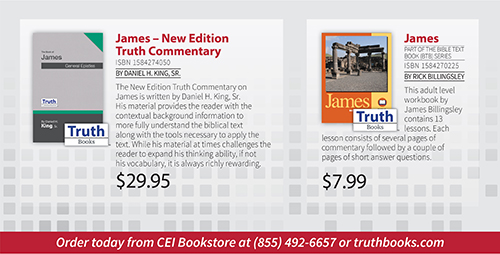

by Allen Dvorak
Synopsis: Warning against divided allegiance, aggressiveness toward brethren, and arrogance toward God, the fourth chapter of James provides the solution: humble repentance, hopeful reliance, and full submission to the heavenly Father.
"See, I have set before you today life and good, death and evil" (Deut. 30:15). Moses had brought the people of Israel to a critical point in their budding history. The people were camped on the eastern side of the Jordan River, prepared to enter the Promised Land. Not allowed to enter Canaan with them, Moses wrote Deuteronomy with the purpose of reminding them of their history and the covenant made at Mount Sinai. He challenged the people to choose between life and death, good and evil, the result of choosing to either serve Jehovah God or other gods (Deut. 30:15-20). It was a clear-cut choice that Moses called upon the people to make—allowing no middle ground.
James addressed some Christians who needed to make a similar choice. They were having difficulty choosing between God and the world and so he described them as "double-minded" and "adulterous people," trying to maintain a relationship with God and the world at the same time (4:4, 8, ESV). James affirmed that this is not possible. "Do you not know that friendship with the world is enmity with God? Therefore whoever wishes to be a friend of the world makes himself an enemy of God" (4:4; ESV). As Jesus taught, God commands that we love Him with all that we are (Matt. 22:37). God does not accept the person whose heart is divided in its loyalty. James' readers needed to make a choice.
In the last section of chapter three (vv. 13-18), James contrasted wisdom that is "earthly, unspiritual, [and] demonic" with the wisdom from above (3:15, 17). Earthly wisdom produces bitter jealousy and selfish ambition leading to "disorder and every vile practice" (3:14-16). It appears from 4:1-3 that James was writing to some Christians who were following earthly wisdom. Quarrels, fights, murder, covetousness—these are the words James used to describe their conduct. There is no contextual reason to suppose that James used the words "fights" and "murder" in a figurative way. These "brethren" were behaving in a carnal fashion, and when they did think to ask from God, the motivation for their prayers was selfishness (4:2-3).
God desired that these Christians make the right choice (vv. 5-6). Note that there is a great deal of variation in the way that popular versions translate verse 5. James counseled them to humble themselves before God and submit to Him. If they resisted the devil, he would flee from them. By contrast, if they would draw near to God, God would draw near to them (vv. 7-8).
In addition to being double-minded, James accused his readers of being arrogant (vv. 6b, 16). Despite their sinful behavior, their lives were filled with laughter and joy. James sternly admonished, "Cleanse your hands, you sinners, and purify your hearts, you double-minded. Be wretched and mourn and weep. Let your laughter be turned to mourning and your joy to gloom" (Jas. 4:8b-9, ESV)
No doubt, in the midst of their "fights" and "quarrels," these brethren had spoken evil of one another and, in their arrogance, had thus become judges of the law rather than doers of the law (vv. 11-12). "There is only one lawgiver and judge, he who is able to save and to destroy"—Christians need to humble themselves and be doers of the law, rather than elevating themselves to the position of judge. We need to be careful of how we talk about our brethren!
Country music singer, Tim McGraw, sings a song entitled "My Next Thirty Years." The lyrics give the impression that the singer has reached the age of thirty and speaks of his plans for the next thirty years of his life. He's going to make some changes in his next thirty years—most of them good changes. He's going to watch his weight, eat more salads, and get more sleep. The next thirty years, he sings, "will be the best years of my life." He's going to spend more time with his wife and other loved ones; he's going to "make up for lost time" in his next thirty years. Yes, it's just a song, but it expresses a common way of thinking, the way that these Christians were thinking. The singer is planning out his next thirty years as though living another thirty years is a given, but the truth is that not one of us is guaranteed even one more day of life! James wrote:
Come now, you who say, "Today or tomorrow we will go into such and such a town and spend a year there and trade and make a profit"—yet you do not know what tomorrow will bring. What is your life? For you are a mist that appears for a little time and then vanishes. Instead you ought to say, "If the Lord wills, we will live and do this or that." As it is, you boast in your arrogance. All such boasting is evil. So whoever knows the right thing to do and fails to do it, for him it is sin (Jas. 4:13–17, ESV).
Note that James describes those whom he quoted (v. 13) as "boasting in your arrogance" (v. 16). It wasn't the fact that they were making plans for the future that earned his rebuke. They planned the future ("We will go… spend a year… trade and make a profit") as though their will and plans were the only factors. The problem was, they were assuming that the future was in their control. This is evident from what James said they should be saying, i.e., "Instead you ought to say, 'If the Lord wills, we will live and do this or that'" (v. 15). The simple truth is that we "do not know what tomorrow will bring" (v. 14a). We need to acknowledge our dependence upon God's will.
James compared our physical lives to "a mist that appears for a little time and then vanishes" (v. 14b). That's why we don't know what tomorrow will bring. It is impossible to be certain about a future that we don't control, not to mention the fact that life is so fragile. Verse 17 begins with a conclusion word ("Therefore," v. 17; NKJV). Since life is fragile and uncertain, we should not put off until the future what we know is the right thing to do today. If we do, we sin.
In the days of Ahab, ruler of the northern kingdom of Israel, the prophet Elijah challenged the people gathered on Mount Carmel to make a choice. "How long will you go limping between two different opinions? If the Lord is God, follow him; but if Baal, then follow him" (1 Kings 18:21). The people of Israel didn't answer Elijah, but James challenges us to answer that we will choose God—and submit to Him.
A special word of thanks goes out to brother Dvorak for his work on this article. Right at the time it was due to be turned in, Allen's mother passed away. Our sympathy and appreciation go out to him for his good work during this difficult time. Thanks, brother!
Author Bio: Allen Dvorak has worked with the Kelly Spring Road congregation in Harvest, AL for eleven years. He and his wife, Debbie, have two grown sons. The church website is spreadingtruth.org. He can be reached at allen.dvorak@reagan.com.
